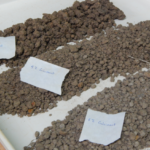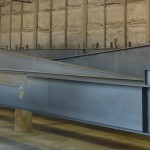Tech Notes
Karst
I want to say one word to you. Just one word. Yes, sir. Are you listening? Yes, I am. Karst There are many definitions of Karst. Following are some of the more succinct ones: Dictionary.com: “an area of limestone terrain characterized by sinks, ravines, and underground streams”; Merriam-Webster.com: “an irregular limestone region with sinkholes, underground…
Read MoreWinter is Coming
In the construction industry, we often think that winter weather conditions are the worst for earthwork operations. Although this may be true, we know from experience that poor weather conditions can strike at any time, often wreaking havoc on construction schedules. When natural drying from hot summer temperatures, warm winds, and time are not possible, we…
Read MoreSoil Compaction Primer
We have been shaping the earth to suit our needs ever since we stopped being hunter-gatherer nomad folk. Properly shaping the ground and making sure it stays the way we intend requires moving soil and compacting soil. Some call it “dirt”. Dirt is the stuff under your fingernails. When we use it as an engineering…
Read MoreA Primer on Coatings
Surface preparation and application requirements for coatings over structural steel are often overlooked in project specifications. While this is not critical for many applications because the steel is covered by other finishes such as gypsum or pre-finished metal panels, it can be problematic for architectural exposed finishes or components requiring fire protective coatings. The typical…
Read MoreMasonry Testing Services
Masonry construction, which has been in existence for centuries, continues to evolve with new products and material applications to meet today’s construction demands. Construction materials testing and field inspections are needed to determine that the masonry products used on the job are in conformance with job and product specifications. These testing and inspection procedures will…
Read MoreDrilling into Education
Geo-Hydro was recently engaged by the Cobb County School District to perform a subsurface exploration and geotechnical engineering evaluation of the planned additions to McCleskey Middle School. During our initial field work we had the privilege of meeting with several McCleskey faculty and staff. But what makes this project special is how our day-to-day project…
Read MoreTesting Agency Qualifications
How many times have you seen project specifications call for the testing agency to meet ASTM E329? Plenty. Long ago somebody put it in a set of standard specs. Those specifications multiplied, and it became one of those items that just carry on year after year, and nobody really pays much attention to it. Since…
Read MoreHot Weather Concreting Guidelines
During hot summer months all projects benefit by implementing hot weather concrete practices. Appropriate hot weather concreting practices are described in ACI 305R. Most project specifications that address hot weather concreting practices only mention that concrete should be placed in accordance with ACI 305, or mention a maximum concrete placement temperature of 90 degrees Fahrenheit.…
Read MoreCold Weather Concreting Guidelines
Cold weather can have some serious, and irreversible, adverse effects on concrete: Inadequate strength gain associated with low concrete temperature Delayed initial set Fluctuations in workability Concrete damage due to freezing at early ages And cold weather for concrete is not really all that cold. Problems can occur at temperatures as warm as 50 F.…
Read MoreNPDES & Construction Sites
Confusion reigns supreme as the construction industry grapples with new Georgia EPD regulations governing storm water discharges from construction sites. EPD has a general permit for 5- to 250-acre sites, which owners and developers can take advantage of, as long as the requirements of the permit are met. First and foremost, a Notice of Intent…
Read More






